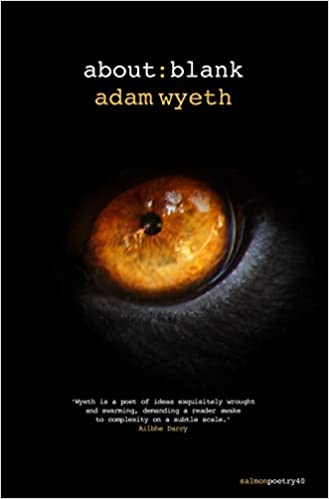about:blank
Adam Wyeth
(Salmon Poetry, 2021); pbk, € 12
Adam Wyeth’s collection is poetic and dynamic, about:blank tentatively explores the nature of writing itself, and where it emerges from. Indeed, the preface of the book proclaims:
<!-- That is exactly what about:blank is.--> }, As soon as you write, it stops being blank. I don’t know what about:blank is. about:blank presents alternatives.()
The preface also displays one of Wyeth’s many chosen forms: a coding-like layout that evokes the sense of a strict, machine-like thinking, something that directs and controls action. Whilst the preface is in this much more structured form, the main collection itself is mercurial and fluid.
Wyeth explores the multiplicity of things: people, animals, physical objects and places. In the collection, the repeated imagery of cats, men, women intermingle and interchange as in ‘Summer’s Death / Seed Fall’, part of a larger, myriad piece:
A car is
a woman
stopped
on the road
that a man
has just
stepped
out of
who is
a cat
waiting
to jump
who is a
beggar
asking
for change
from a
child
who is
a bird
falling.
The uncertain sense of being is a concern which Wyeth’s poetry revolves around; uncertainty dominates throughout each piece and point. Nowhere else is this better seen than in ‘The Wrongs & Rites of Grosvenor Square’, a poem of near-drama written as if characters had lines, and where the narrator appears as a third voice recognised by the characters as an author writing about them. This frank breaking of the fourth-wall disrupts the strange reverie in a display of the reality of writing – when it returns to its ephemerality, one feels the sensitivity to an even greater degree.
The end brings out a curious epilogue in which the writer at last becomes the action. The length of time this position is held is a private contract between performers and audience to be negotiated internally each time which will inevitably shape and determine the blankout [.]
The ending of this piece embodies the honesty of a dynamic relationship between author and reader, and continues into the tentative nature of writing itself, as reflected by the shift from reflective prose to the sudden stanza break space before ‘blankout’. That the author’s thoughts and reflections devolve back into the strange manner of writing suggests the continued endeavour—the contradictorily impossible task of encapsulating in writing.
This tone is reinforced by ‘Yoga for Beginners’, a piece which shifts from a seemingly real yogic guide, only to devolve into a frantic garble of writing with strange, messy punctuation and syntax:
What is said out loud and what remains repeated in the head? Relax wrist .pucker lips .release filter-tip and place between teeth .and light .inhale .hold .close your eyes shoulders relaxed .sho-ping [.]
This manner imbues writing with a sense of real emotion. Its structure and syntax portray the writer’s panic, and any attempt at professional distancing undone before the reader’s eyes. Yet, in this, one can touch the writer’s soul… a connection forms and as the collection continues, the growing sense that connections form in all writing.
about:blank is a book exploring writing, but in doing so, touches on all acts of creation and documentation. It offers no ending, but a portal into an ongoing process which defies closure, offering only the ephemeral nature of the thing itself – the only conclusion that can be reached from such a piece as about:blank.
It begins with a memory.
It begins with a seed.
It does not begin as it means to go on.
(‘Summer’s Death / Seeds Fall’, p. 27)
This is the way. The way it ends. The way always. This is the way. Always the end. It comes back. This is the way. The way it returns. This is the end. On repeat.
(Epilogue)
James McLeish


Leave a Reply